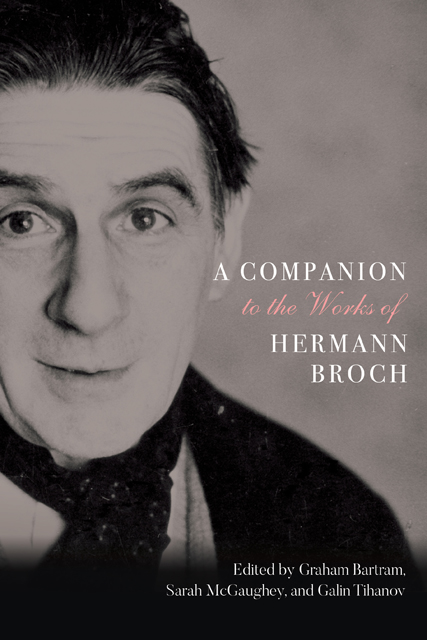Book contents
- Frontmatter
- Contents
- Preface
- Acknowledgments
- List of Abbreviations
- Introduction: Broch’s Life and Works
- 1 Perspectives on Broch’s Die Schlafwandler: Narratives of History and the Self
- 2 Hermann Broch and the Dilemma of Literature in the Modern Age
- 3 Interrogating Modernity: Hermann Broch’s Postromanticism
- 4 Broch and the Theater: Die Entsühnung and Aus der Luft gegriffen as Tragic and Comic Dramatizations of the Economic Machine
- 5 Limits of the Scientific: Broch’s Die Unbekannte Größe
- 6 Broch’s Die Verzauberung: Ludwig Klages and the Bourgeois Mitläufer
- 7 Hermann Broch’s Massenwahnprojekt and Its Relevance for Our Times
- 8 Human Rights and the Intellectual’s Ethical Duty: Broch’s Political Writings
- 9 Broch’s Der Tod des Vergil: Art and Power, Language and the Ineffable
- 10 From the “Tierkreis-Erzählungen” to Die Schuldlosen: The Creation of Broch’s Last Novel
- 11 Broch’s Legacy and Resonance
- Selected Bibliography
- Notes on the Contributors
- Index
2 - Hermann Broch and the Dilemma of Literature in the Modern Age
Published online by Cambridge University Press: 20 January 2023
- Frontmatter
- Contents
- Preface
- Acknowledgments
- List of Abbreviations
- Introduction: Broch’s Life and Works
- 1 Perspectives on Broch’s Die Schlafwandler: Narratives of History and the Self
- 2 Hermann Broch and the Dilemma of Literature in the Modern Age
- 3 Interrogating Modernity: Hermann Broch’s Postromanticism
- 4 Broch and the Theater: Die Entsühnung and Aus der Luft gegriffen as Tragic and Comic Dramatizations of the Economic Machine
- 5 Limits of the Scientific: Broch’s Die Unbekannte Größe
- 6 Broch’s Die Verzauberung: Ludwig Klages and the Bourgeois Mitläufer
- 7 Hermann Broch’s Massenwahnprojekt and Its Relevance for Our Times
- 8 Human Rights and the Intellectual’s Ethical Duty: Broch’s Political Writings
- 9 Broch’s Der Tod des Vergil: Art and Power, Language and the Ineffable
- 10 From the “Tierkreis-Erzählungen” to Die Schuldlosen: The Creation of Broch’s Last Novel
- 11 Broch’s Legacy and Resonance
- Selected Bibliography
- Notes on the Contributors
- Index
Summary
Hermann broch was a poeta doctus: he took a vital interest in contemporary cultural discourse; in specialized philosophical fields like logic, epistemology, and ethics; but also in mathematics. During the war years and the early postwar period his focus shifted from a vitalist critique of contemporary culture toward the construction of a philosophy of history based on the theory of values. After taking university courses in mathematics and philosophy in the second half of the 1920s, however, Broch grew dissatisfied with the limited reach of theoretical writing, particularly the Ludwig Wittgenstein–influenced logical positivism of the Vienna Circle, and turned to literature, spurred by his “Ungeduld der Erkenntnis” (impatience of knowledge) and what he saw as literature’s promise of a more immediate and broader ethical effect. Opting for or against literature remained a dilemma throughout his life, as Broch wavered between the “mere aesthetics” of art and the more directly engaging impetus of political and ethical theory.Hence, it was only during a rather short phase in his life (1927–32) that Hermann Broch aspired to be a full-time literary author.Nevertheless, in his 1941 “Autobiographie als Arbeitsprogramm” (KW 10/2, 195–203; Autobiography as a Program of Work) he presents his turn to literature with the existential urgency of a conversion experience to rival those of Ludwig van Beethoven or Friedrich Nietzsche. Paul Michael Lützeler has pointed out, however, that Broch to some extent tailored his own biography in hindsight in order to give more dramatic weight to his decision.Broch claims that he had to turn to literature to escape the oppressive dominance of logical positivism. As Lützeler points out, however, the University of Vienna’s curriculum was hardly dominated by logical positivism and would have allowed for his urge to study metaphysics. In the following, the focus is on Broch’s earliest prose writings and his theory of kitsch, because these lesser-known texts constitute a helpful backdrop to his poetics. We then tackle his lifelong struggle with the validity of literature as a mode of expression alongside the production of theory, pamphlets, or letters.
Early Prose Writings: Antiliterature?
Broch’s “Eine methodologische Novelle” (KW 6, 11–23), published in 1918,had long been considered a mere finger exercise at the margins of Broch’s literary oeuvre. Since the mid-1980s, however, this text has turned into a major critical touchstone, generating a body of research culminating in a book-length study.
- Type
- Chapter
- Information
- A Companion to the Works of Hermann Broch , pp. 59 - 72Publisher: Boydell & BrewerPrint publication year: 2019



